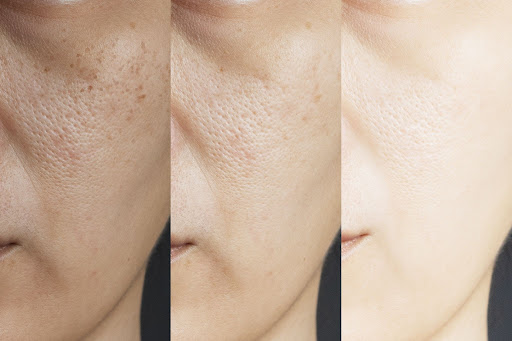Last Updated on June 18, 2025
To treat hydroquinone damaged skin, it is important to first stop using the hydroquinone product. In addition, using gentle, non-irritating skincare products containing ingredients such as hyaluronic acid, antioxidants, and collagen boosters can help repair and rejuvenate the skin.
Hydroquinone is a commonly used skin-lightening agent that can cause skin damage and discoloration when used improperly or for a prolonged period. If you have experienced hydroquinone damaged skin, it is crucial to discontinue the use of any products containing hydroquinone.
However, simply stopping the use of hydroquinone may not be enough to restore your skin’s health and appearance. We will explore effective methods to treat hydroquinone damaged skin and restore its natural radiance. By following these steps, you can start the journey towards healthier, balanced skin.

Credit: harleystreet-md.co.uk
Recognizing Hydroquinone Damage
Hydroquinone Damage can be recognized through signs like skin irritation, redness, inflammation, and darkening of the skin. Treating hydroquinone damaged skin involves avoiding further use, gentle cleansing, moisturizing, and incorporating natural remedies rich in antioxidants and skin-healing properties.
Symptoms Of Hydroquinone Damaged Skin
If you have been using hydroquinone-containing products to treat hyperpigmentation or other skin concerns, it’s important to be aware of the potential side effects and symptoms of hydroquinone damaged skin. Recognizing these symptoms early can help you seek appropriate treatment and minimize long-term damage. Here are some common indicators to watch out for:
- Darkening or lightening of the skin: One of the primary signs of hydroquinone damage is irregular pigmentation. This can manifest as dark patches or spots, or conversely, as areas of lighter skin.
- Increased sensitivity: Hydroquinone can sometimes cause skin irritation and sensitivity. If you notice heightened sensitivity to products, along with redness, itching, or a burning sensation, it may be a result of hydroquinone damage.
- Thinning of the skin: Prolonged use of hydroquinone can potentially thin the skin, making it more susceptible to injuries, bruising, and other damage. If you notice that your skin looks thinner or more fragile than usual, it could be a sign of hydroquinone-related damage.
- Uneven texture: Damaged skin may appear rough, uneven, or have an overall lack of smoothness. This can make it difficult for makeup or other products to apply evenly, further highlighting the damage.
- Increased dryness or oiliness: Hydroquinone damage can disrupt the natural moisture balance of the skin, leading to either excessive dryness or increased oiliness. You may notice flaking, peeling, or excessive shine in the affected areas.
Differentiating Hydroquinone Damage From Other Skin Conditions
While the symptoms discussed above are indicative of hydroquinone damaged skin, it’s important to rule out other potential skin conditions that may present similar symptoms. Here are a few key differences to help you differentiate hydroquinone damage from other skin issues:
| Hydroquinone Damage | Other Skin Conditions |
|---|---|
| Irregular pigmentation | Consistent skin discoloration |
| Increased sensitivity | Presence of rashes or hives |
| Thinning of the skin | Normal skin thickness |
| Uneven texture | Consistent roughness or smoothness |
| Imbalanced moisture | Typical moisture levels for your skin type |
By comparing the symptoms you are experiencing with the characteristics listed above, you can get a better understanding of whether hydroquinone damage is the likely cause.
Treating Hydroquinone Damaged Skin
Have you been struggling with hydroquinone damaged skin? Don’t worry, you’re not alone. Hydroquinone, a popular skin-lightening ingredient used to treat hyperpigmentation, can sometimes cause unwanted side effects, leaving the skin dry, irritated, and damaged. In this article, we will explore effective ways to treat hydroquinone damaged skin, helping you restore your skin’s health and beauty. Let’s delve into the solutions step by step.
Discontinuing Hydroquinone Use
When it comes to treating hydroquinone damaged skin, the first step is to discontinue the use of hydroquinone products. While hydroquinone can effectively lighten dark spots, prolonged use can lead to adverse effects. By stopping the use of hydroquinone, you allow your skin to recover and minimize any further damage.
Restoring Skin’s Moisture Barrier
One of the key aspects of healing hydroquinone damaged skin is restoring the skin’s moisture barrier. Hydroquinone can strip away the skin’s natural oils, leading to dryness and sensitivity. To combat this issue, it is essential to focus on moisturizing your skin. Invest in a good-quality moisturizer containing hyaluronic acid, glycerin, or ceramides to replenish the skin’s hydration levels and strengthen its barrier function.
Using Skin-lightening Alternatives
While hydroquinone is a common choice for treating hyperpigmentation, there are several skin-lightening alternatives available. These alternatives can help fade dark spots without causing damage to the skin. Look for ingredients such as vitamin C, niacinamide, azelaic acid, or kojic acid, which are known for their brightening properties. These alternatives can be gentler on the skin while still providing effective results.
Applying Soothing And Healing Ingredients
Another crucial step in treating hydroquinone damaged skin is the application of soothing and healing ingredients. Look for products that contain ingredients like aloe vera, chamomile, green tea extract, or oatmeal. These ingredients are known for their calming properties and can soothe irritated and inflamed skin. Additionally, consider incorporating products with antioxidants like vitamin E or resveratrol, which can help repair damaged skin cells and promote healing.
Seeking Professional Advice
If you are experiencing severe or persistent skin damage from hydroquinone, it is crucial to seek professional advice. A dermatologist can provide personalized recommendations and treatments based on your skin’s needs. They might prescribe topical creams or suggest procedures like chemical peels or laser treatments to address the damage effectively. Always remember that professional guidance can make a significant difference in your skin’s recovery.
By following these steps, you can effectively treat hydroquinone damaged skin and restore your skin’s health and beauty. Discontinue hydroquinone use, restore your skin’s moisture barrier, explore skin-lightening alternatives, and apply soothing and healing ingredients. Remember, seeking professional advice is vital for severe cases. Take care of your skin and embrace a confident, radiant complexion!
Preventing Hydroquinone Damage
Preventing hydroquinone damage is crucial when it comes to maintaining healthy and radiant skin. Hydroquinone, although commonly used in skin-lightening products, can cause adverse effects if not used properly. In this section, we will explore some effective preventative measures to protect your skin from hydroquinone damage.
Choosing Hydroquinone-free Products
One of the key steps in preventing hydroquinone damage is to opt for hydroquinone-free products. Choosing alternatives that are formulated without this ingredient can reduce the risk of skin complications. Many skincare companies now offer a wide range of non-hydroquinone options that are just as effective in lightening the skin.
Alternative Skin-lightening Ingredients
If you are looking for safer alternatives to hydroquinone, there are various skin-lightening ingredients that you can consider. These ingredients are not only gentle on the skin but also effective in reducing pigmentation. Some popular alternatives include:
| Ingredient | Benefits |
|---|---|
| Kojic Acid | Aids in reducing melanin production and brightening the skin tone. |
| Vitamin C | Acts as an antioxidant and helps to fade dark spots and improve skin texture. |
| Niacinamide | Reduces hyperpigmentation and enhances the skin’s moisture retention. |
By incorporating products containing these alternative ingredients into your skincare routine, you can achieve a more even complexion without the negative effects associated with hydroquinone.
Practicing Sun Protection
Exposure to the sun can further damage hydroquinone-treated skin, leading to increased pigmentation and other harmful effects. Therefore, it is crucial to practice proper sun protection to prevent exacerbating the damage. Here are some sun protection tips to keep in mind:
- Apply a broad-spectrum sunscreen with an SPF of 30 or higher before stepping out into the sun.
- Wear protective clothing, such as wide-brimmed hats and long-sleeved shirts, to shield your skin from harmful UV rays.
- Avoid peak sun hours, typically between 10 AM and 4 PM, when the sun’s rays are the strongest.
By incorporating these sun protection practices into your daily routine, you can minimize the risk of further damage to your skin.
Maintaining A Healthy Skincare Routine
To prevent hydroquinone damage and keep your skin in optimal condition, it is essential to establish and maintain a healthy skincare routine. Here are some tips to help you achieve that:
- Cleanse your skin twice a day using a gentle cleanser appropriate for your skin type.
- Exfoliate regularly to remove dead skin cells and promote cell turnover.
- Moisturize daily to keep your skin hydrated and supple.
- Use products with antioxidants to protect your skin from free radicals and environmental stressors.
- Avoid excessive scrubbing or harsh treatments that can irritate your skin.
By following a consistent skincare routine, you can not only prevent hydroquinone damage but also maintain overall skin health and radiance.

Credit: www.reddit.com
Credit: www.quora.com
Frequently Asked Questions On How To Treat Hydroquinone Damaged Skin?
Can You Reverse The Effects Of Hydroquinone?
Yes, the effects of hydroquinone can be reversed. Several treatments, such as chemical peels or laser therapy, can help fade hyperpigmentation caused by hydroquinone. It’s important to consult with a dermatologist for personalized advice and treatment options.
Does Hydroquinone Irritation Go Away?
Yes, hydroquinone irritation can go away.
How Do You Fix Skin Damage From Bleaching Cream?
To fix skin damage from bleaching cream, start by discontinuing its use. Follow up with gentle cleansing and moisturizing using products suitable for sensitive skin. It’s important to protect your skin from the sun with a broad-spectrum sunscreen. If the damage persists or worsens, consult a dermatologist for proper evaluation and treatment.
Why Is My Skin Peeling After Using Hydroquinone?
Hydroquinone can cause skin peeling due to its exfoliating properties. The ingredient promotes the shedding of dead skin cells, revealing new skin underneath. This process may cause temporary peeling as the old skin is sloughed off, resulting in a brighter complexion.
How Can Hydroquinone Damage The Skin?
Hydroquinone can damage the skin by causing irritation, redness, dryness, and even darkening of the skin in some cases.
What Are The Signs Of Hydroquinone Damaged Skin?
Signs of hydroquinone damaged skin include increased sensitivity, inflammation, uneven skin tone, and the appearance of brown spots or patches.
Conclusion
Repairing hydroquinone damaged skin requires a gentle and consistent approach. By following the tips and remedies discussed such as using natural ingredients, moisturizing regularly, and protecting your skin from sun damage, you can help restore its health and radiance.
Remember to consult a dermatologist for personalized advice and treatment options. Taking care of your skin is essential for maintaining its overall well-being and promoting a more youthful appearance. So, start implementing these practices and enjoy the benefits of healthy, glowing skin.


